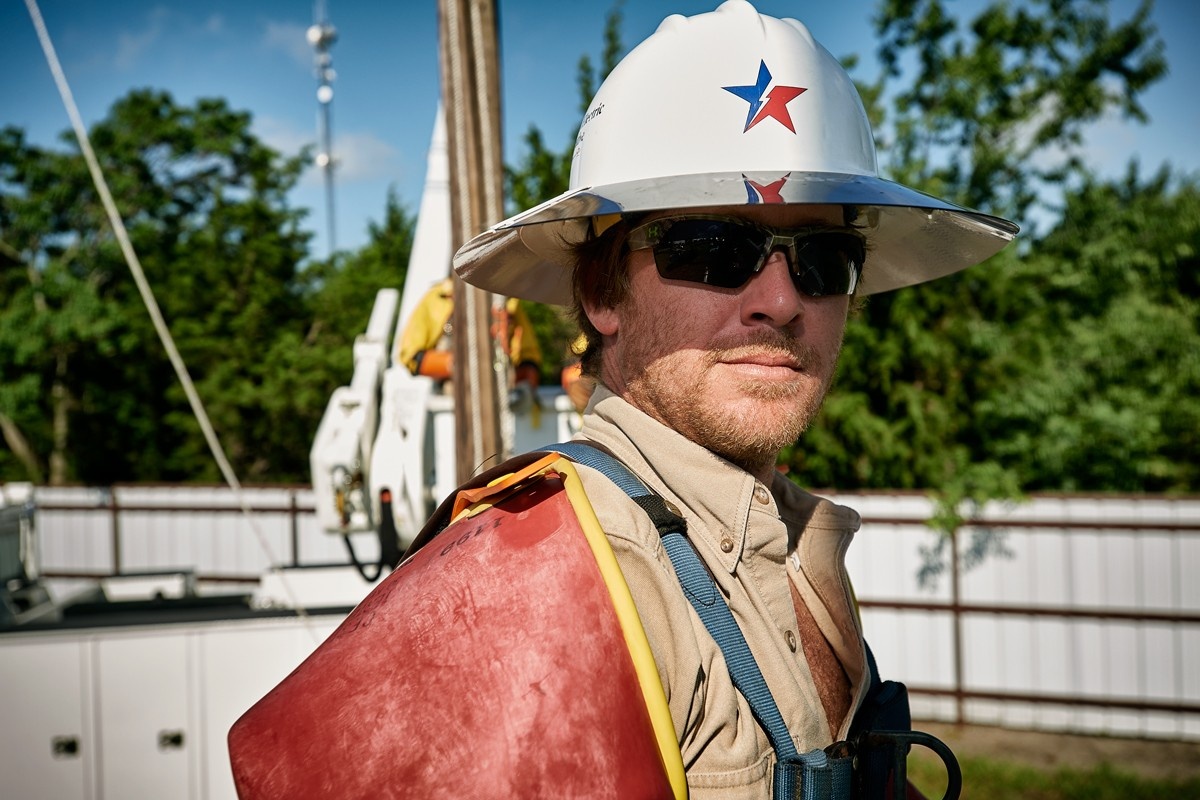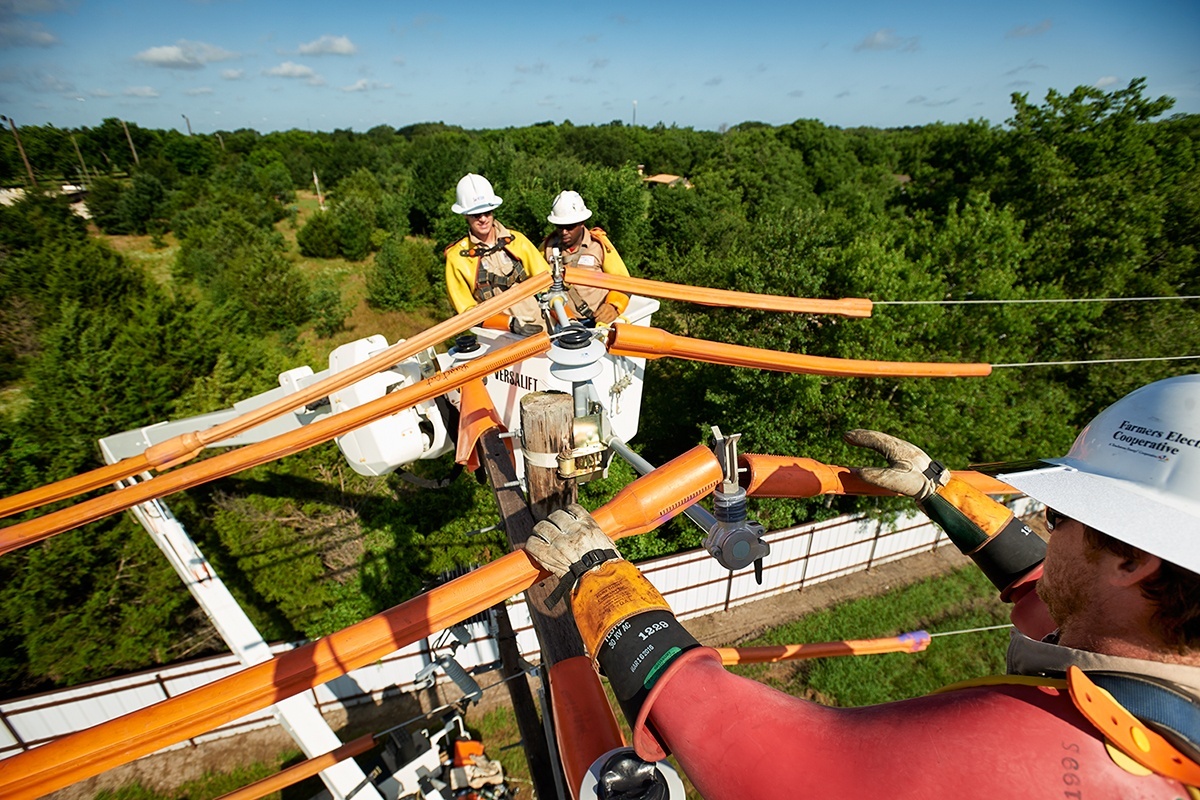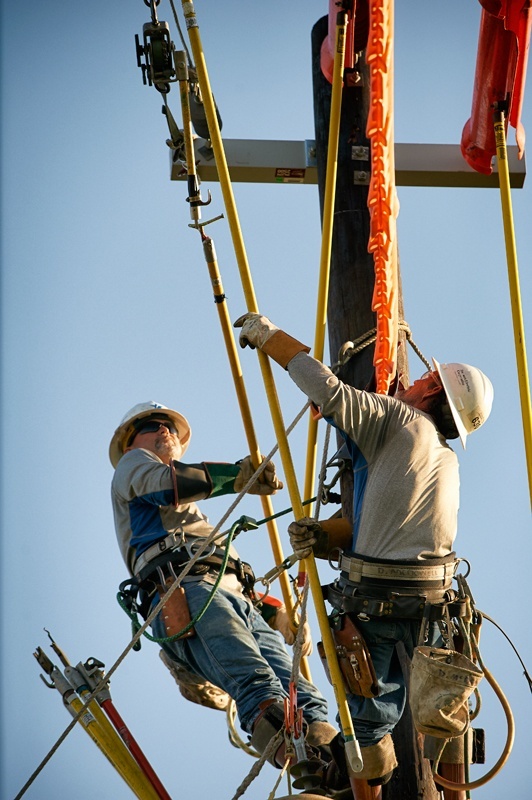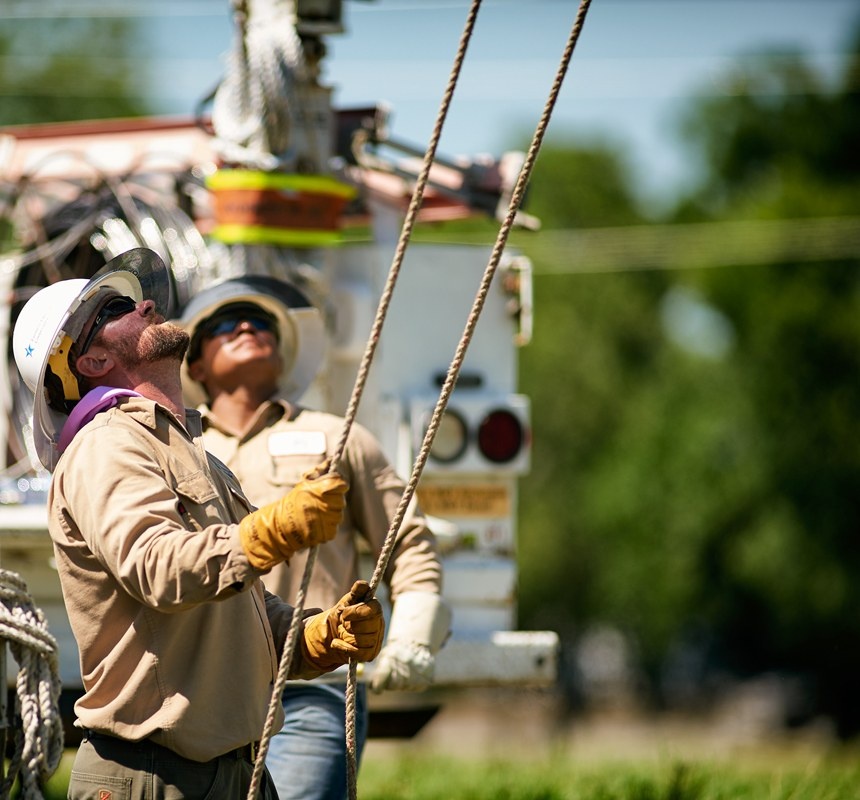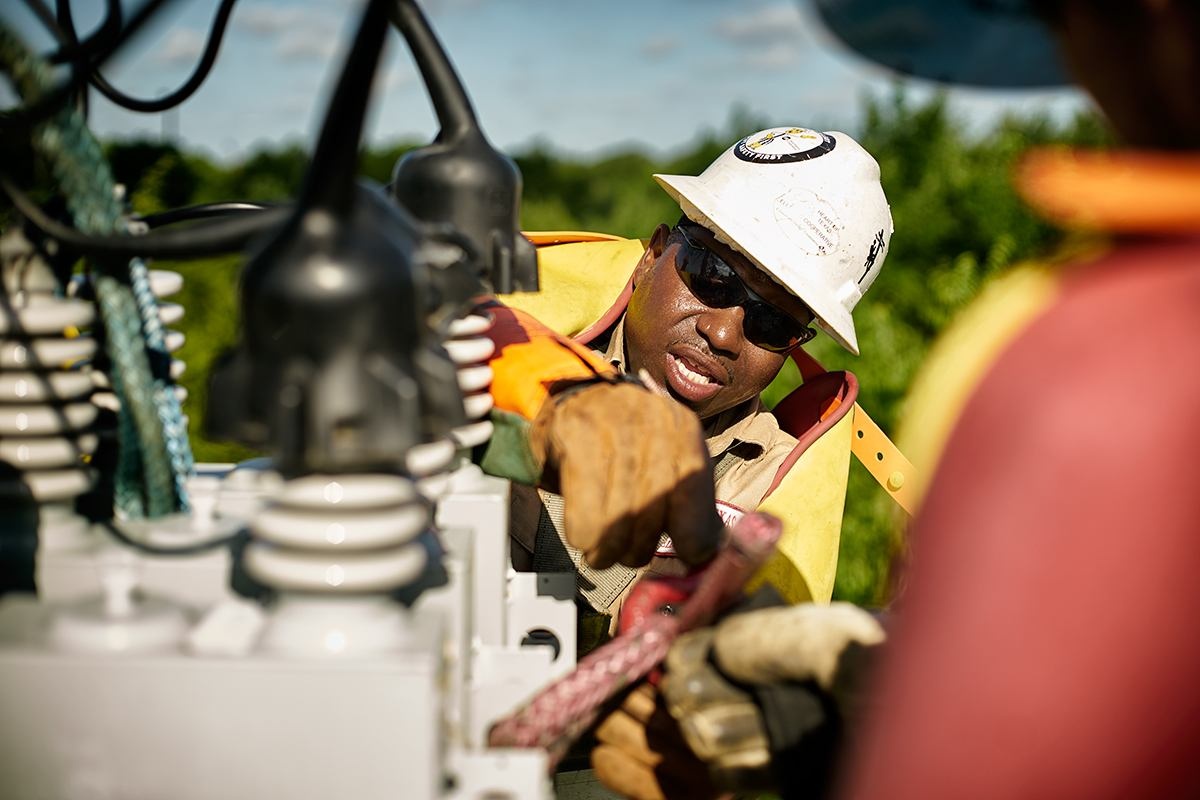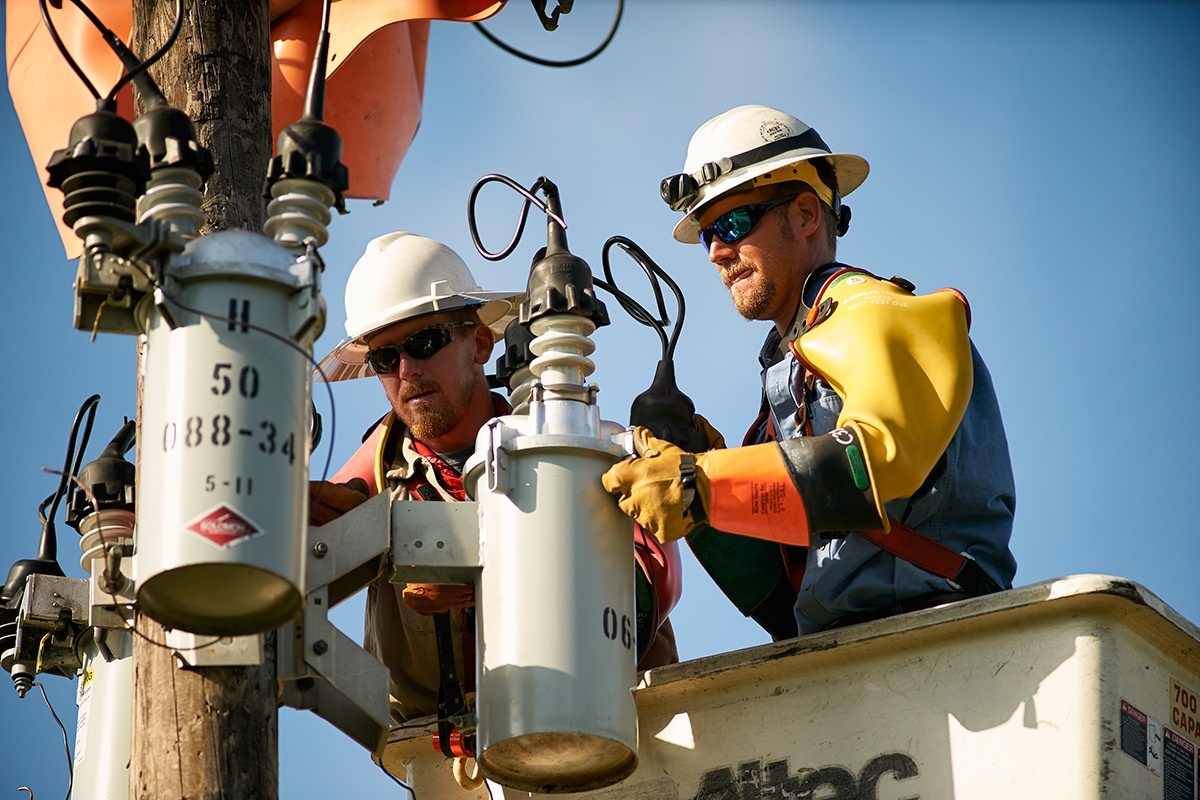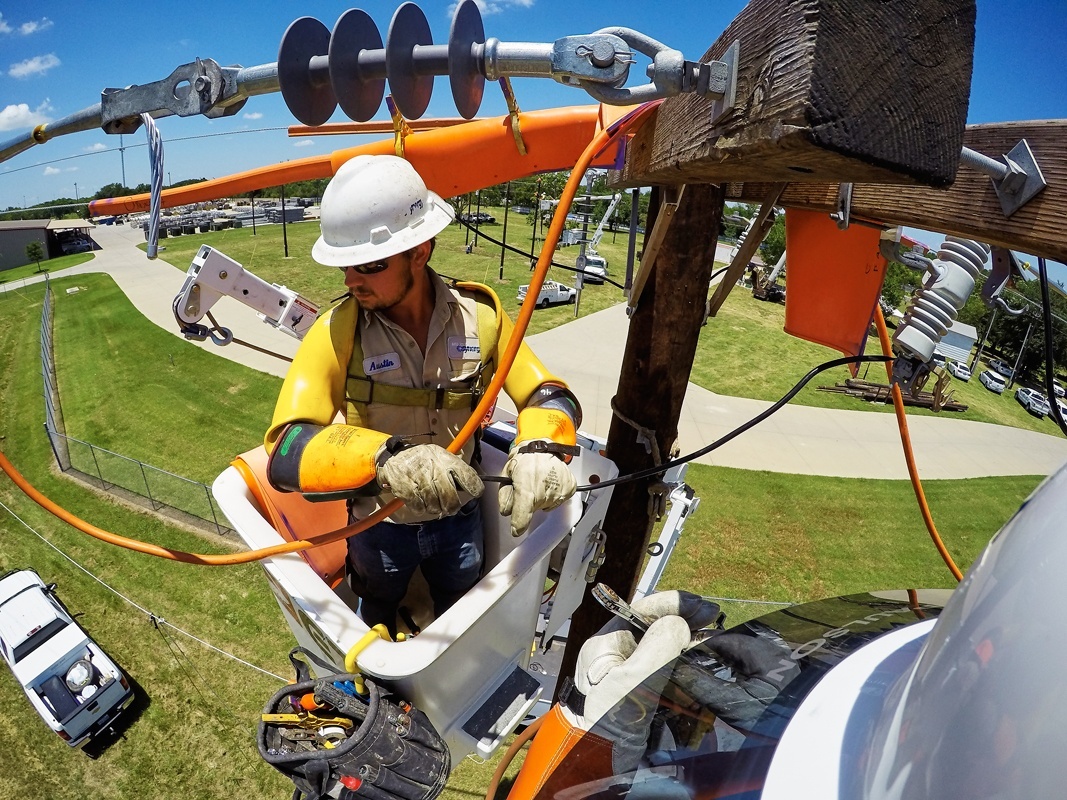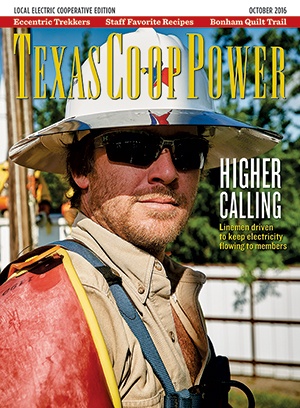Cramer Basham recalls the day in 2012. Severe weather approached his home in Krum, and he kissed his wife and young daughter before sending them next door to join their neighbors in the safety of a below-ground storm shelter.
Basham would not be joining them to wait out the storm. Instead, he headed directly into the lightning and thunder, ultimately working all night to help calm the chaos. Basham is an electric cooperative lineman at CoServ, and thousands of people in Denton County, just northwest of Dallas, depend on him and his brethren to keep the power on, or get it back on quickly, even in the worst weather.
Linemen perform the duties—sometimes routine but often physically demanding and always potentially dangerous—that keep the electric grid operating smoothly. When every home, office, school and hospital has electricity, linemen are taken for granted.
That’s fine with them.
But when lightning and violent storms tangle power lines, snap poles and destroy transformers, linemen scramble into action, moving systematically across their co-ops’ service territories to repair damage. They toil until the power is back on, day and night if they have to.
That’s fine with them.
“It takes a special breed to do that job,” says Basham, a crew foreman. It’s a breed fueled by a fierce commitment to service, much like other first responders—firefighters, police and emergency medical personnel. It’s a breed that charges into crisis situations without hesitation.
“I think we’re first responders because at every major disaster, we’re there,” says Don Bland, a lineman at Farmers Electric Cooperative in Greenville, 50 miles northeast of Dallas. In North Texas, tornadoes, floods, ice storms and hurricanes can knock out power to hundreds or even thousands of homes and businesses.
“It takes 75 to 80 years to build all the lines in a system, and a tornado can tear it down in a matter of minutes,” says David Nance, a Kyle-based former lineman and current safety specialist with Texas Electric Cooperatives.
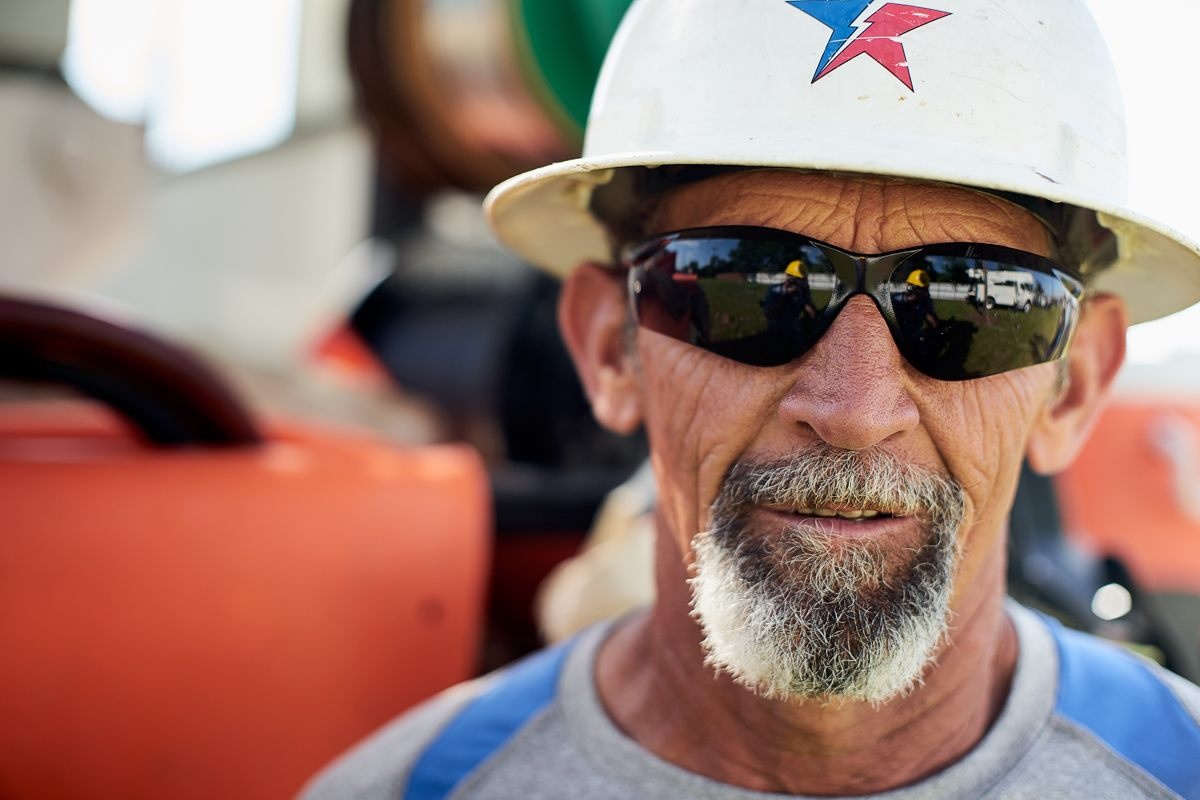
The most rewarding part of the job for Farmers Electric Cooperative lineman David McDowell is simple: “Getting electricity to people.”
Dave Shafer
David McDowell, a crew foreman, has witnessed many disasters in his 32 years at Farmers EC. Besides working storm recovery in the Greenville area, McDowell has assisted neighboring co-ops time and again, whenever trouble calls. Co-ops regularly collaborate to solve challenges, guided by the Seven Cooperative Principles that form the core values of co-op operations, including Cooperation Among Cooperatives. After all, storms don’t respect the boundaries set up by service areas, and all co-op members are equal.
In one dramatic example, when Hurricane Katrina hit Louisiana in 2005, McDowell worked 45 days away from home. He was not alone: Co-ops in 27 states sent workers to Mississippi and Louisiana to repair the electric grid.
McDowell grew up in a lineman family. His grandfather, father and four of his uncles were linemen. Both of his brothers also did line work. So McDowell knew he could be called upon at any time to help restore power to members. “That’s part of the life,” he says. “No sooner do you take your boots off, and you’re lacing them back up again.”
His daughters didn’t follow in his footsteps, but they knew the drill. Years ago, when they were little, the phone would sometimes ring as soon as he got home from work. If it was Farmers EC calling, he’d let his girls answer, and they’d pick up the phone and say, “Daddy have to go back out again?”
Countless times, the answer was, “Yes.”
That’s fine with them.
Daddies, husbands and sons spring back into their trucks when they get the call. It’s the lineman way. “They understand that electricity is no longer a luxury,” says Billy Marricle, president and general manager at San Bernard EC in Bellville, 60 miles east of Houston. “Their attitude is: It’s their family that is without power.”
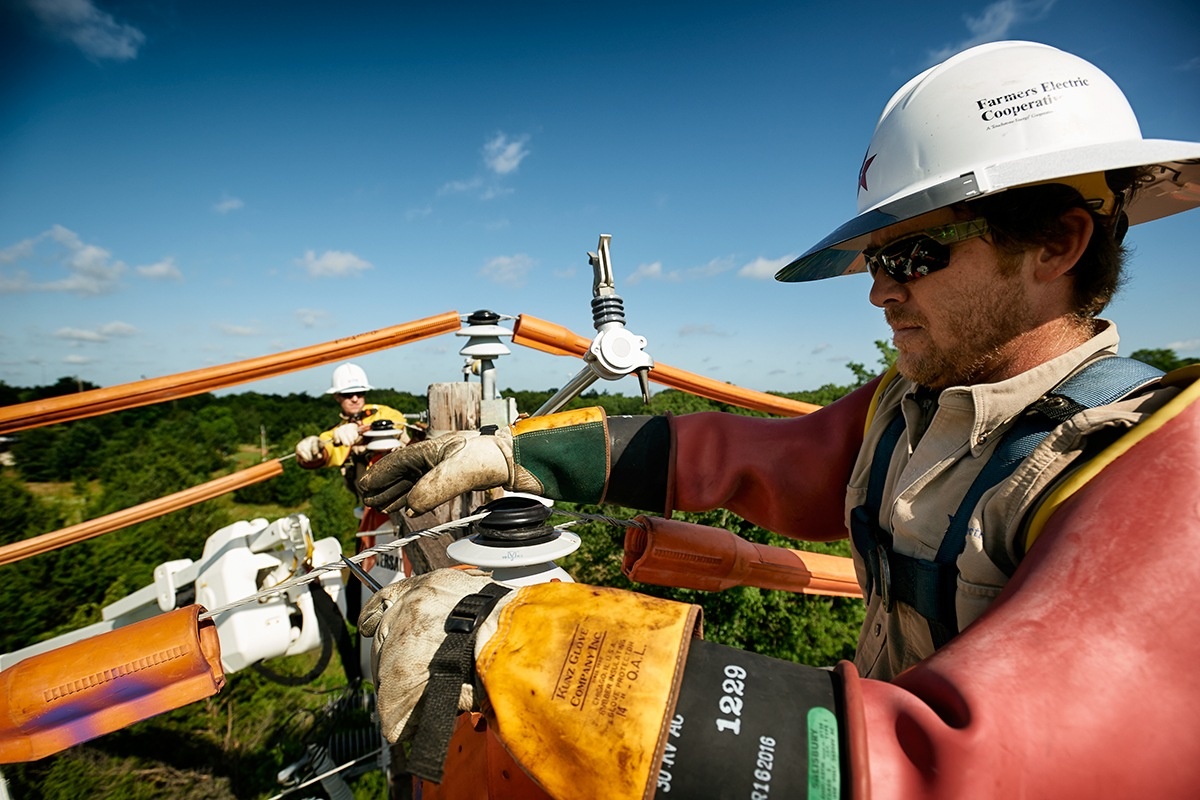
Web Extra: Greg Mays of Farmers EC wears personal protective equipment, including insulated gloves and sleeves and a harness, as he works from a lift bucket during a Hotline School in June. Garrett Dillard of Denton Municipal Electric assists in the job.
Dave Shafer
They Have a Servant’s Heart
Electric cooperatives in Texas serve more than 3 million people and maintain more than 379,000 miles of line, and they receive higher scores in the 2015 American Customer Satisfaction Index than investor-owned or municipal utilities.
Linemen tend to be the most visible co-op employees in the community. They drive large trucks that haul poles and spools of wire to worksites. Then they rise high above the landscape, perched in lift buckets that will place them within easy reach of the energized power lines and transformers that need attention.
This public presence also puts linemen within easy reach of co-op members. “I had a lady give me a hug last week,” says Brandan Blunt, a lineman at Farmers EC who had just come off a long week of storm recovery. “I put her lights on that night.”
Not all encounters are so friendly, especially when members grow impatient during an outage. Bland remembers when one woman at a worksite unleashed a barrage of bad language. She knew all the words, he said. “And some I didn’t know.”
Service to the community can exceed linemen’s normal first-responder duties. Linemen sometimes are the first motorists to come across collisions, and when they do, they provide first aid. They’re often credited with saving victims’ lives.
Because they’re perched high off the ground, linemen can be the first to notice fires. They call 911 and try to rush to the scene to offer assistance.
San Bernard EC linemen thwarted a crime last year when they noticed an unfamiliar car parked in front of a member’s house. They blocked the car in the driveway, and authorities arrested a suspected burglar.
Several co-ops in Texas have participated in NRECA International, a program that sends linemen to Haiti to help electrify that country and build its first electric co-op.
“What they do is thrilling and satisfying,” says Billy Harbin, general manager at Lighthouse EC in Floydada, 50 miles northeast of Lubbock. “Linemen are highly trained to do a challenging job that nobody else can do without the physical and mental skills they possess. The best linemen have another quality to be admired: They have a servant’s heart and want to help people.”
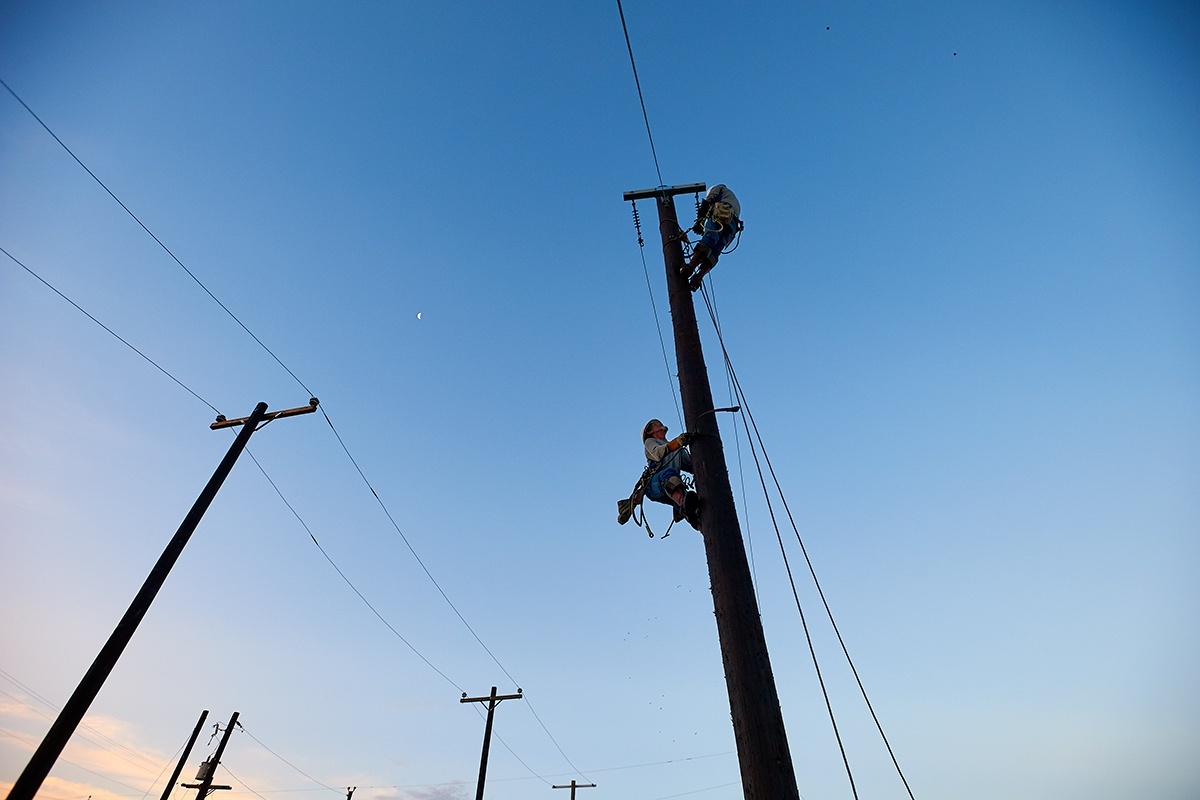
Web Extra: David McDowell, bottom, and Danny Moss, members of Farmers EC’s lineman’s rodeo team, get some early-morning practice in before their regular shift starts.
Dave Shafer
Nothing Beats Homegrown
A career spent outdoors maintaining the electric grid doesn’t come without significant desk time. It can take five years or more of rigorous training to become a journeyman lineman. That includes classroom instruction in addition to hands-on work in the field.
TEC’s Loss Control program provides lineman and safety training statewide—reaching more than 1,000 students at 53 schools in 2016. TEC also conducts more than 900 safety meetings a year and holds an annual conference for hundreds of linemen to participate in ongoing safety and career education. TEC coordinates the South Plains College Certified Electric Power Lineman Associate and Certified Degree programs. Victoria EC has joined with Victoria College to provide lineman training.
Once hired at an electric cooperative, linemen receive on-the-job training provided by the co-op, often in partnership with TEC’s Loss Control program.
“There is a very high demand for linemen across the U.S.,” says Bobby Christmas, senior executive manager of compliance, safety, loss control and transportation at Guadalupe Valley EC in Gonzales, 70 miles east of San Antonio. “There’s even a higher demand for apprentices seeking to build a career in our field.”
Co-ops have strong connections to their communities, and many co-ops seek to hire employees, including linemen, from their areas. “The biggest challenge for small, rural co-ops like Lighthouse is to recruit and retain young folks who want to make a life in a small-town setting.” Harbin says. “We do our best to recruit locally, concentrating on people with family ties to our community.”
Marricle follows the same approach. “Nothing beats homegrown,” he says. “Homegrown individuals typically already have the bond within their community. The cooperative is generally a well-respected organization, and they want to be a part of it. Our membership has watched them grow up, and they dare not let those folks down.”

Web Extra: Greg Mays of Farmers EC wears personal protective equipment, including insulated gloves and sleeves and a harness, as he works from a lift bucket during a Hotline School in June. Garrett Dillard of Denton Municipal Electric assists in the job.
Dave Shafer
Respect the Electricity
Linemen require extensive training because the job is inherently dangerous. They often work 35 feet or more off the ground, either in buckets or after climbing a pole. They use harnesses and special restraints to prevent falls. They wear hard hats, safety glasses and flame-resistant clothing. To prevent electrical contact, they wear rubber gloves—some protect against up to 30,000 volts—and heavy rubber sleeves for when they reach near energized equipment.
But accidents happen. “There are hazards associated with line work that can have devastating consequences if they are not dealt with properly,” Harbin says. “The job is not dangerous unless the worker fails to learn and obey the safe work rules required to mitigate the hazards. That’s why we place such great emphasis on safety training: because it truly is a matter of life and death.”
“This is not a business that is very forgiving if you make a mistake,” Christmas agrees. That’s why Forbes magazine ranks the profession No. 7 on its list of most dangerous occupations.
“The biggest deal is, don’t get complacent,” says CoServ’s Basham. “Respect the electricity.”
All These Lights Coming On
Bland talks about being atop a pole or in a bucket during a storm, when 40-mph winds are whipping him and lightning is striking all around. He shakes his head and says, “It ain’t a natural thing to do.”
But it’s his calling, so he focuses on the job, which, on stormy nights, entails getting the electricity moving again. The result is rewarding. “Then I see all these lights coming on in houses down there,” he says.
Soon the storm passes, and everybody again has the electricity they have come to expect. Air-conditioning units hum throughout neighborhoods. Video games captivate their players. Dishwashers do the dirty work.
And linemen get to go home and take their boots off—at least for a little while.
That’s fine with them.
——————–
Tom Widlowski is the Texas Co-op Power associate editor.
